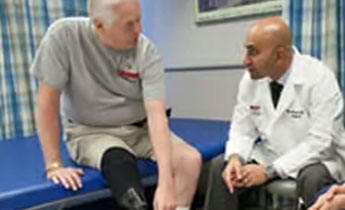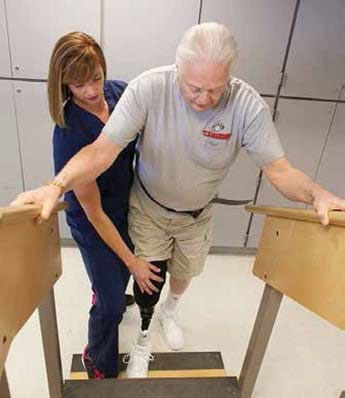Some of the toughest work in Weiss Hospital happens in the 4th floor rehabilitation room. But it’s also the source of countless success stories—and lots of laughter.
One morning this past winter, Wayne Vosgerau, who manages a limo company in Chicago, sat on a padded bench in the rehab room, moving his leg back and forth. He was joking around with a group of physical therapists when Physiatrist Rahul Sharma, MD, Medical Director for Rehabilitation Services at Weiss, walked in. The two greeted each other like old friends.
The team had grown close over the past year. They met after Wayne’s right leg was amputated, due to a wound that wouldn’t heal for nearly a year. When the wound became infected, and the infection spread to his bone, Wayne underwent an amputation to prevent further harm. His surgery took place in July 2013.
Prior to that, Wayne says, “I was on a walker for over a year and in and out of doctors’ offices every week. The best thing that happened was the leg being taken off.”
Dr. Sharma has heard that sentiment before. “People say that in the long-run, all the doctors’ appointments take over your life.”

“The patient is part of the team here,” says Dr. Sharma, who specializes in rehabilitation medicine. “We find a way together.”
Though losing the leg was ultimately for the best, life after amputation wasn’t easy…at first. Wayne spent four days in the Intensive Care Unit at Weiss, followed by almost two weeks in in-patient rehabilitation. He then continued with therapy as an outpatient, coming to Weiss twice a week for three hours at a time. A former U.S. Marine, Wayne likens the experience to “boot camp,” but says that was perfect for him. “I wanted to get back to my life. I hadn’t had a life for the past year because of that wound.”
Two months after surgery, Wayne got a prosthetic leg, and his journey through rehab took a different turn. He had to learn to walk again, and to not drag the prosthetic—a task that makes getting around in Chicago’s snowy winters a challenge.
However, Physical Therapist LeAnna Becker (pictured with Wayne) says, “He was faster than typical patients, determined, and he healed well.”
MOVING ON
A few months after surgery, Wayne was driving again. He learned to use hand controls for braking and accelerating. No longer was he slowed down by a wound.
Able to walk again, Wayne traveled to Las Vegas and New York for work, and took a vacation to New Orleans, where he quickly found his balance and learned to maneuver his prosthetic over the uneven brick streets. Nothing was going to hold him back.
“Weiss rehab has the best staff I’ve ever seen. They make you want to work, and I’m proof of that,” he says.

